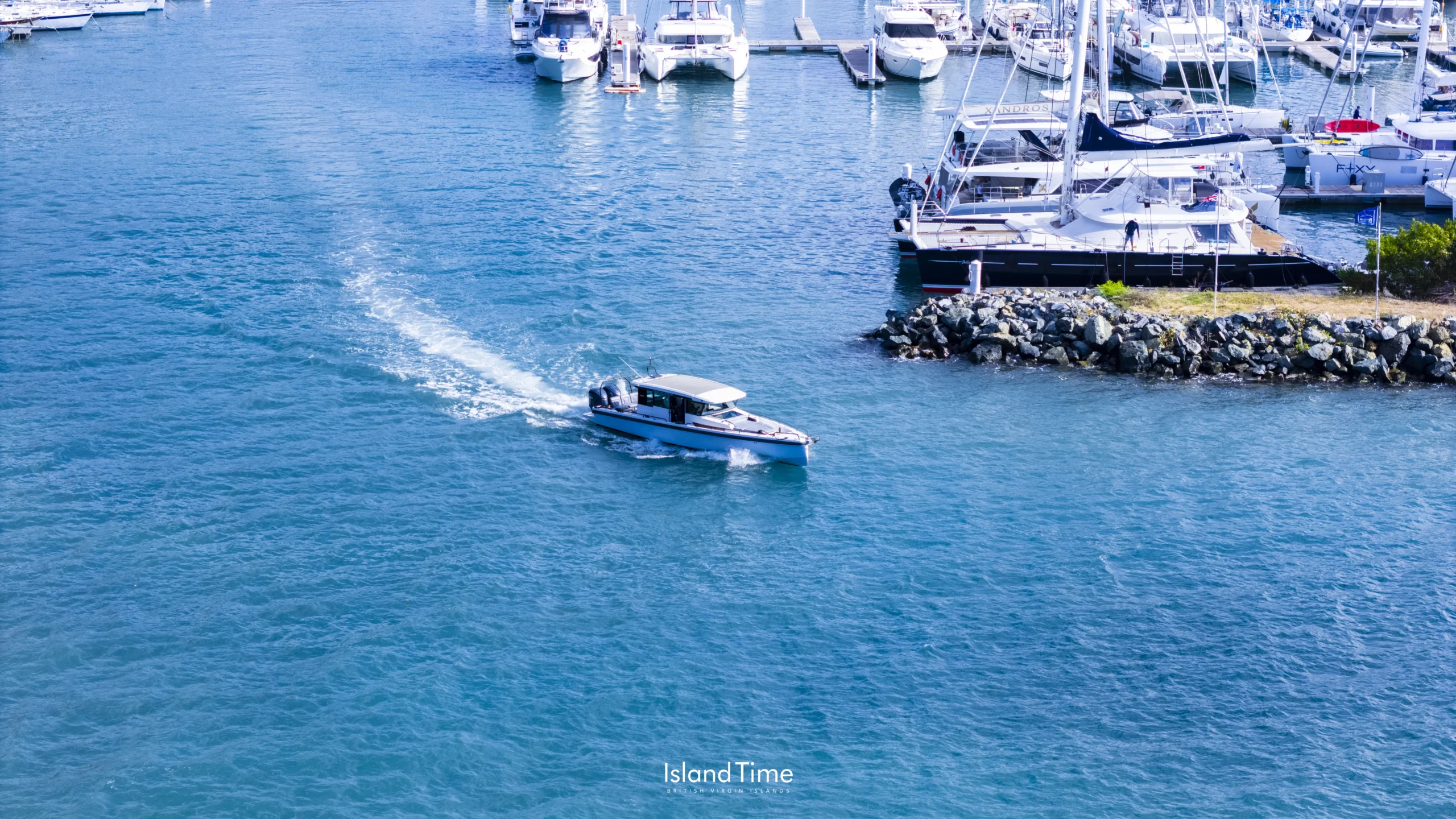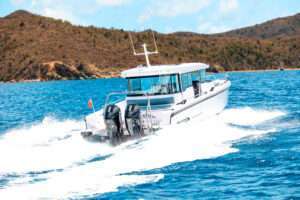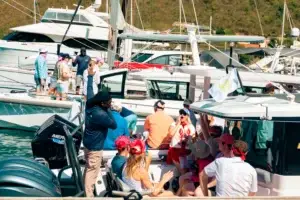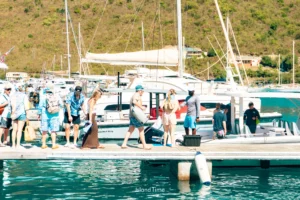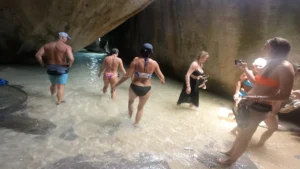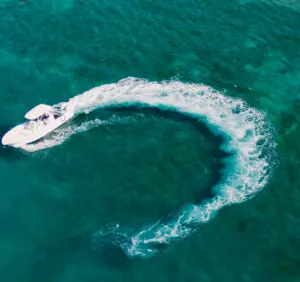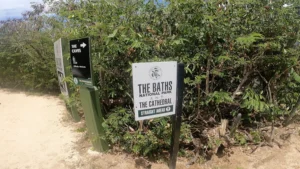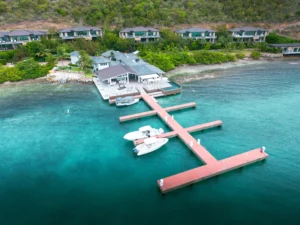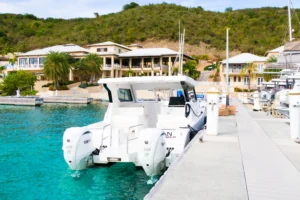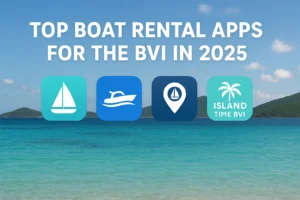Water Taxi services in the BVI and USVI are evolving to offer you a more eco-friendly way to explore these stunning islands. By using electric and hybrid boats, these water taxis significantly reduce carbon emissions, lowering your environmental impact during island hopping. Additionally, strict coral reef protection measures during drop-offs help preserve fragile marine ecosystems you likely want to enjoy for years to come. To further enhance sustainability, many operators now provide carbon-neutral island-hopping packages, allowing you to travel responsibly while experiencing the beauty of the Caribbean seas.
Key Takeaways:
- The implementation of eco-friendly water taxis, utilizing electric and hybrid boats, reduces carbon emissions in the waters of the BVI and USVI.
- Strict coral reef protection measures are enforced during passenger drop-offs to preserve marine biodiversity and prevent environmental damage.
- Carbon-neutral island-hopping packages offer tourists an environmentally responsible way to explore multiple islands without increasing their carbon footprint.
- Integration of sustainable boating technology supports cleaner transportation options, promoting long-term ocean health.
- Collaborative efforts between tourism operators and environmental organizations enhance awareness and protection of the marine ecosystem in the Virgin Islands.
Eco-Innovation on Waves: The Rise of Electric and Hybrid Water Taxis
You’ll notice that a growing number of water taxi operators in the BVI and USVI are shifting to electric and hybrid vessels. These boats not only navigate the islands with a quieter, smoother ride but also mark a significant step toward minimizing environmental harm. The quiet operation reduces underwater noise pollution, which helps protect marine life, especially sensitive coral reef ecosystems. Hybrid models combine battery power with efficient fuel use, enabling longer trips with a significantly lower carbon footprint compared to traditional diesel engines. This technology directly aligns with ongoing coral reef protection measures, as less pollution and physical disturbance during drop-offs contribute to preserving reef health.
By exploring the islands aboard these high-tech vessels, you’re actively participating in a movement toward sustainable tourism that balances enjoyment with environmental stewardship. Local operators have also integrated carbon-neutral island-hopping packages into their offerings, allowing you to offset the emissions of your journey completely. Such combined efforts not only help maintain the pristine waters and vibrant reef systems you came to explore but also set a measurable example for other tourism sectors aiming for sustainability.
Benefits of Electric and Hybrid Vessels
Electric and hybrid water taxis produce significantly less greenhouse gas emissions than traditional fossil-fuel-powered boats. The waters of the BVI and USVI have historically been at risk from the exhaust and spill pollution common in marine transportation, which impacts water quality and coral health. With electric propulsion, exhaust gases are eliminated, reducing your travel’s contribution to air and water contamination. Additionally, reduced fuel consumption leads to lower operating costs, allowing operators to offer these eco-friendly services without compromising on convenience or frequency.
The quieter operation of these vessels also benefits the underwater environment by minimizing disturbance to marine animals. Noise pollution disrupts the natural behaviors of fish and marine mammals, especially around breeding and feeding grounds. When your water taxi glides almost silently, it preserves the delicate balance of aquatic ecosystems you’re visiting, especially near coral reefs that thrive only under low-stress conditions. Furthermore, electric propulsion reduces vibrations that can damage sensitive underwater flora and fauna nearby during drop-offs, a key concern in coral reef protection strategies.
Current Operators in the BVI and USVI
Several pioneering operators in the BVI and USVI have embraced electric and hybrid technology, positioning themselves at the forefront of sustainable marine transport. Some companies incorporate coral reef protection protocols during passenger drop-offs, including designated, reef-safe mooring spots and guided landings that prevent physical damage to the reef.
Such operators often pair their eco-friendly transport with carbon-neutral island-hopping packages, allowing you to enjoy multi-stop tours while having your carbon footprint offset via verified reforestation and renewable energy projects. These strategic efforts demonstrate a serious commitment from the tourism industry to preserve the waters’ ecological integrity, helping to ensure the environment continues to enchant visitors for decades to come.
Navigating Environmental Responsibility: Coral Reef Protection Strategies
The Caribbean’s coral reefs are among the most delicate yet vibrant ecosystems on the planet, and your choices while island-hopping can have a lasting impact. Water taxi operators in the BVI and USVI are increasingly adopting practices that actively safeguard reefs during drop-offs, ensuring that your visits don’t contribute to reef degradation. Among these measures, the use of precise anchoring systems and designated docking zones helps prevent destructive contact with coral structures. By limiting boat placements to safe mooring buoys or engineered docks, you participate in minimizing physical damage to corals, which are sensitive to even minor disturbances.
The integration of electric and hybrid water taxis further supports reef protection by reducing water pollution from fuel emissions and noise disturbance, which can stress marine life. Your participation in carbon-neutral island-hopping packages also helps fund ongoing reef conservation projects. Such initiatives directly tie your ecotourism activities to efforts that monitor reef health, facilitate coral restoration, and educate locals and visitors alike on sustainable interactions with marine environments.
Best Practices for Minimizing Damage During Docking
One key best practice involves careful navigation and slower approaches when arriving at reef-adjacent docks or landing areas. Water taxi captains trained in environmental stewardship utilize advanced electric throttle systems that enable smooth, precise control, preventing abrupt movements that can disrupt sediment. You’ll notice that these boats are equipped with propeller guards and shallow drafts, designed to reduce contact with the seafloor and thereby limit potential harm to benthic communities.
The use of predetermined drop-off points where coral cover is minimal or absent reduces the risk of accidental damage to the reef. Operators employ anchoring methods, such as eco-friendly mooring balls, which secure boats without the need for traditional anchors that can damage coral formations. When you step off the water taxi, you’re less likely to contribute to reef trampling because these designated zones are selected with their environmental sensitivity in mind, significantly lowering cumulative stress on the ecosystem.
Collaboration with Local Conservation Efforts
Water taxi services have become valuable partners in local coral reef conservation programs, often linking their carbon-neutral island-hopping fares directly to funding reef restoration projects. For example, some operators collaborate with organizations such as the Virgin Islands Coral Reef National Monument and the BVI Marine Parks to support coral nursery initiatives and reef monitoring activities. This collaboration ensures that a portion of your fare helps foster scientific research, community outreach, and enforcement of sustainable marine practices. These partnerships also involve educating passengers on reef-friendly snorkeling and diving etiquette to prevent inadvertent damage after drop-off.
Beyond financial support, many water taxi guides participate in conservation volunteer days, helping to remove invasive species and clean up reef sites. As a tourist, your engagement with these programs can often extend through guided eco-tours that offer immersive learning experiences, connecting you directly with the island’s efforts to maintain reef vitality. These combined actions help establish a feedback loop where sustainable transport and active reef protection reinforce each other, serving both local communities and your ecotourism experience.
Carbon-Neutral Journeys: Pioneering Sustainable Island-Hopping Packages
Island-hopping in the BVI offers breathtaking experiences, and now you can explore these stunning destinations with a dramatically reduced carbon footprint. Carbon-neutral island-hopping packages combine the convenience of eco-friendly water taxis with carefully calculated carbon offset programs to offset emissions from travel activities. These packages often incorporate electric or hybrid boats, which emit less than 50% of the CO₂ compared to conventional ships, aligning transportation with your commitment to sustainability.
Beyond reducing emissions, these journeys include thoughtfully designed itineraries that minimize environmental disruption. For example, drop-offs avoid sensitive coral reef zones, preserving biodiversity while you enjoy snorkeling or beach excursions. Your adventure becomes not just a journey between islands but a conscious choice to protect the marine ecosystems that make the Virgin Islands unique.
Integrating Carbon Offsetting in Travel Itineraries
Carbon offsetting has been seamlessly integrated into these sustainable island-hopping experiences, allowing you to neutralize the environmental impact of your travel. Specific initiatives, such as reforestation projects in the Caribbean and investments in renewable energy, are directly linked to the emissions associated with your trip. Providers calculate the carbon footprint for each itinerary—down to the number of passengers and the type of boat—to offer an accurate and transparent offset contribution included in your package price.
Engaging with carbon offsets transforms your holiday into part of a larger environmental solution. Some companies even provide detailed reporting on how your contributions support local communities, such as funding mangrove restoration efforts that protect shorelines and serve as natural carbon sinks. This tangible impact brings you closer to the islands’ ecosystems, extending your responsibility beyond just leaving no trace.
Partnerships with Eco-Conscious Providers
Behind the scenes, collaborations between water taxi operators and eco-conscious tourism providers amplify the impact of carbon-neutral packages. You’ll notice that many tours are coordinated with resorts, local guides, and conservation groups who share a commitment to sustainable practices. These alliances ensure that every aspect of your island-hopping—from transport to activities—aligns with environmental standards designed to safeguard the region’s natural heritage.
For instance, providers partner with certified green resorts that use solar power and water-saving technologies, complementing the low-emission transportation you already benefit from. Local guides often educate visitors on coral reef preservation and marine wildlife protection, enriching your experience while fostering stewardship. Additionally, some operators incorporate plastic waste collection initiatives into their tours, transforming your leisure time into an active environmental restoration effort.
Expanding partnerships with certified environmental organizations guarantees accountability and continuous improvement across these offerings. You can expect transparent reporting on sustainability benchmarks and regular audits to maintain clean marine environments during your travels. This level of integration helps solidify the BVI and USVI as leaders in eco-friendly marine tourism, making your island adventure both unforgettable and responsible.
Passenger Engagement: Educating Tourists on Sustainability
Travelers experience firsthand how sustainable tourism can be integrated into their adventures through interactive education provided by water taxi operators. Onboard electric and hybrid water taxis, guides often share real-time information about the benefits of reduced emissions, explaining how these quiet, eco-conscious vessels help protect the delicate marine environment around the BVI and USVI. Many tours incorporate briefings on coral reef protection measures, emphasizing the importance of careful drop-off locations and the impacts of anchoring or pollution on these fragile ecosystems. This approach not only enhances your appreciation for the islands but also encourages responsible behavior during your visits.
Beyond the boat ride itself, digital apps and in-person materials introduced at kiosks or during bookings offer engaging content about local conservation efforts. By illustrating how carbon-neutral island-hopping packages offset emissions through projects such as mangrove restoration or renewable energy, operators connect your travel choices directly to sustainable outcomes. These initiatives transform your trip from a simple excursion into an opportunity to support the preservation of the unique marine and island environments you explore.
Initiatives for Increasing Awareness Among Travelers
Several operators in the BVI and USVI have launched educational campaigns tailored specifically for water taxi passengers. Interactive displays aboard vessels utilize real-time data to demonstrate how hybrid engines can reduce your carbon footprint by up to 70% compared to traditional boats. Visual guides highlight the zones where coral reefs thrive, explaining why drop-offs are avoided in sensitive areas and what you can do to minimize any disturbance. These efforts combine science with storytelling, deepening your understanding of why sustainable practices matter here more than elsewhere.
Some tours also partner with local marine biologists who occasionally join rides to provide expert insights on reef health and biodiversity. They explain the fragile balance that keeps coral ecosystems thriving and spotlight community initiatives combating coral bleaching. By connecting you directly with these stories, water taxi services foster a sense of stewardship, motivating you to participate mindfully in preserving the natural wonders around you.
Incentives for Eco-Friendly Choices
Choosing eco-friendly water taxi options often comes with tangible incentives designed to reward your sustainable travel decisions. Operators offer discounted fares or loyalty points when you book carbon-neutral island-hopping packages, encouraging repeat usage of electric or hybrid boats. Many services have streamlined booking platforms that highlight these green options, making it easier for you to identify and select tours that prioritize low emissions and reef protection. Some locations even provide small perks, such as reusable water bottles or vouchers for local eco-conscious restaurants, aligning your entire travel experience with sustainable values.
Additional incentives include partnerships with local businesses that recognize and reward passengers who adhere to guidelines for coral reef preservation during excursions. For example, visitors who participate in guided reef snorkeling with certified eco-friendly operators may be eligible for discounts on future water taxi rides. These programs reinforce your positive impact, turning sustainable choices into a more enjoyable and rewarding part of your island journey.
The Future of Sustainable Travel in the Caribbean
Expanding the use of electric and hybrid water taxis across the BVI and USVI will significantly transform your island-hopping experiences while minimizing environmental impact. As technology advances, these vessels are becoming increasingly efficient, with battery capacities enabling longer routes without refueling. Integrating coral reef protection protocols at every docking point ensures that the delicate marine ecosystems you enjoy remain unharmed, preserving biodiversity for future visits. Expect to see a stronger synergy between transportation innovation and ecological safeguards, making your journeys both seamless and sustainable.
Carbon-neutral island-hopping packages are set to become a standard offering, going beyond simple transportation. By factoring in offsets like mangrove reforestation projects and renewable energy investments, these packages enable you to enjoy the pristine waters and vibrant reefs with a smaller carbon footprint. This holistic approach shifts the focus from individual legs of travel to an entire eco-conscious itinerary, aligning perfectly with the growing expectations of travelers seeking responsible tourism options in the Caribbean.
Trends Shaping Upcoming Initiatives
Integration of smart navigation systems into electric and hybrid water taxis is becoming a game-changer for sustainable travel. These systems optimize routes in real time, reducing energy consumption and avoiding sensitive coral areas during drop-offs. You’ll notice improved travel times, combined with proactive environmental protection measures that help reduce physical disturbances to underwater habitats.
Collaborations between local authorities and private operators are increasing, with a focus on certifying water taxis to environmentally friendly standards. Such certifications often include strict noise pollution limits and zero-emission goals, raising the bar for an eco-friendly travel experience. Additionally, immersive educational programs onboard inform you about the fragility of coral reefs and guide best practices during island visits, fostering a deeper connection with the natural surroundings.
Stakeholder Roles in Promoting Sustainability
Local governments, tourism boards, and water taxi operators each carry significant responsibility in advancing sustainable travel models. By enforcing regulations on boat construction standards and operating procedures, authorities help ensure that all vessels you use meet stringent eco-friendly criteria. Water taxi companies that invest in continuous staff training around coral reef ecology and sustainable navigation empower crews to take proactive steps during every passenger drop-off. Partnerships with conservation organizations also enable the ongoing monitoring of reef health and the implementation of adaptive protection strategies.
Tourism operators who package carbon-neutral island-hopping experiences collaborate with carbon offset programs and renewable energy projects, adding tangible environmental benefits to your itinerary. At the same time, local communities benefit from sustainable tourism through job creation and the preservation of cultural heritage, making your travel experience more meaningful. You’re not only a spectator but an active participant in a network that supports both environmental and economic resilience throughout the Virgin Islands.
Presently, sustainable tourism initiatives in the BVI and USVI are transforming the way you experience island travel by prioritizing environmental responsibility, particularly through the use of eco-friendly water taxis. These electric and hybrid boats reduce emissions, allowing you to navigate the pristine waters with a significantly smaller carbon footprint. Additionally, coral reef protection measures during drop-offs ensure that the delicate marine ecosystems you visit remain vibrant and healthy, fostering a more immersive and conscientious connection with nature.
Beyond transportation, carbon-neutral island-hopping packages offer you a thoughtful approach to exploring multiple destinations while offsetting your environmental impact. By embracing these initiatives, you actively support the preservation of the islands’ natural beauty and biodiversity. Your choices contribute to promoting a sustainable tourism model that balances enjoyment and conservation, making your travel experience both responsible and rewarding.
By: Jason Itumay
Your SEO Expert and Web Developer

